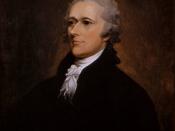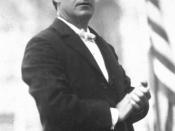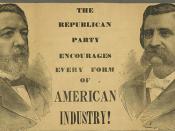As many social changes took place during the early 19th century, American culture began to establish its own identity. Although the Federalist party met its demise soon after the "revolution" of 1800 and Republicans gained political power, the new American culture did not entirely reflect a republican vision of the nation's culture. As Republican idealists attempted to create the America they envisioned, the actual circumstances of the country and the world prevented many of their ideas from becoming reality.
One outstanding example of this is Jefferson's reaction to Napoleon's offer that would become known as the Louisiana Purchase. Obviously, it was an incredible bargain, but it went against the Republican view of the Constitution; typically, Republicans were strict constructionists and believed anything left out of the Constitution could not be done. That is why when this offer came about, and nothing in the Constitution mentioned obtaining new territory, Jefferson hesitated.
According to the strict-constructionist view, America did not have the power to buy this territory. However, Jefferson was eventually persuaded into accepting the sweetheart deal, a move that would greatly benefit the nation's future but also make Jefferson somewhat of a hypocrite.
Another instance of the failure of Republican idealism to instill itself into the nation's culture is the beginnings of the American Industrial Revolution. Although Republicans advised against development of manufacturing, the early 1800s brought many new inventions and technological advances that would develop into a manufacturing economy by the mid-19th century. America began to look forward to industrializing the country, ignoring Jefferson's hopes for an agricultural economy.
One more example where American culture contradicted the Republican vision is the spread of nationalism. A Republican view would place emphasis on the states, while a Federalist view would typically make the United States of America seem more like one unified country and not an alliance of separate nation states. Although the Federalist party was on its downfall, Federalist concepts influenced the nationalism among the people that would develop. As America sought to establish its own identity, nationalists put more faith in the Federal government. This is not what the Republicans had expected or exactly hoped for, but since it was Republicans in power, it never became an issue for them.( Schwengel, 2002)Rather than be influenced by Republican leaders, the developing nation had influence of its own on those leaders. America's culture began to grow apart from the Republican vision of the future, and the conceptual ideas of Jefferson and Madison were not fully implied in the nation's society. The young culture was becoming more diverse, conservative, and unique before conflict began building up again, prior to the Civil War.
The social culture and policy of the Republican Party have seen a similar transformation, with the GOP seemingly adopting a strange combination of anti-science, pro-Christian policies that are part William Jennings Bryan, part Father Charles Coughlin. Examples include the belief that "the unborn child has a fundamental individual right to life, which cannot be infringed, even when the future mother was raped or the victim of incest"; support for tax-funded vouchers for children to attend religious schools (under the convenient euphemism of "parental choice")(Michelle, 2000), and a hostility to offering gay couples the same rights as heterosexuals. With the election of President George W. Bush, government funded faith-based charities have also been resurrected from the conservative policy graveyard, but their prospects were recently damaged when Christian fundamentalists realized that the government would also have to fund such "undesirable" religions as Buddhism and Hinduism. This conclusion has not slowed the pro-Christian program in the Republican Party, though. (Gienapp, 2000)To further trace the Republican Party's transformation from a party of blue blood northeastern gentlemen to a party of southern agrarian populists, one need only trace the transformation of Bush family politics. The first in the line of succession, Senator Prescott Bush (former R-Connecticut), George W's grandfather and a product of northeastern wealth, was brought to the Capitol by Mayflower friends from Brown Brothers Harriman and Connecticut country clubs. He was a classic Rockefeller Republican, fiscally conservative but socially progressive.
ReferencesGienapp, W.2000.The Origins of the Republican Party, 1852ÃÂ56Michelle Cottle, Open Season, NEW REPUBLIC, Feb. 21, 2000, 23.
Schwengel, F.2002. The Republican Party. 34-40





